Topic: Water rights
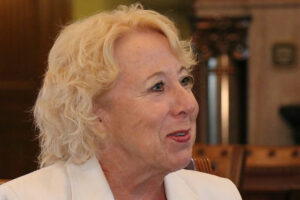
Interview of Christine Downey, August 2, 2019
Interviewed by Dale Goter
Former State Senator Christine Downey recalls her three terms in the Kansas Senate (1993-2004) during her 2019 oral history interview. With her background as a teacher, education issues were important to her as the era of school-funding litigation continued. She was involved in water-related policy making, in particular at the nexus of water quality and agricultural practices. She recalls her service in the Senate and on the Kansas Board of Regents first developing the policy and then implementing fundamental changes to the postsecondary education system. Ms. Downey discusses numerous instances of working across the aisle Show Moreto accomplish policy objectives that did not break on strict party lines. Show Less

Interview of Lon Frahm, June 18, 2020
Interviewed by Rex Buchanan
In this 2020 oral history interview, Lon Frahm describes his involvement in groundwater policy development as a member of Northwest Groundwater Management District No. 4. During the 1990s, he challenged the zero-depletion policy (to take only the amount of water that will be naturally replenished). Frahm supported local control of water management. He observed that over the years control over water planning has shifted to state-level water agencies, particularly the Kansas Water Office, that are not “invested personally” in managing water in northwest Kansas. In his view, state Water Plan funding has resulted in spending that Show Moredoes not help farmers and other local interests. Frahm cites the importance of local culture in setting water policy using as an example the Local Enhanced Management District (LEMA) in Sheridan County. He notes that the success of that endeavor grew out of the shared values of the farmers and a local market for grain. Frahm argues that changes in water use will be very slow over time, and water use should not be held back because we cannot predict the future. Show Less
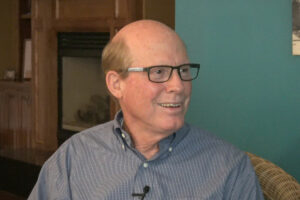
Interview of Ken Grotewiel, December 5, 2019
Interviewed by Rex Buchanan
In this 2019 oral history interview, former Representative Ken Grotewiel recalls learning about the state and its urban/rural divide in addressing water issues. He found that these issues were not generally decided on a partisan basis. While representing Wichita in the Kansas House of Representatives, Grotewiel developed a good working relationship with Carl Dean Holmes, a Republican House member from western Kansas, especially on water issues, when they served together on the House Energy and Natural Resources Committee. Although Grotewiel had a reputation as a liberal environmentalist, he views his approach as that of a pragmatist. Among the Show Morewater issues addressed during his service in the House were purchasing storage in federal reservoirs that involved “minimum desirable stream flows,” irrigation, “water rights” that can affect streams, and the interbasin transfer of water. Grotewiel describes in some detail the challenges of passing legislation to fund the State Water Plan; legislation strongly opposed by farm groups and irrigators. He sites approval of water plan funding as an example of bipartisan cooperation and as the most significant accomplishment during his time in the Legislature. By the time he was appointed by Governor Sebelius to be Assistant Director of the Kansas Water Office in 2002, he noted considerable breakdown of civility in the Legislature. Among issues Grotewiel worked on during his service in the Water Office were use of federal money to purchase water rights along the Arkansas River and the purchase of land to protect the Equus Beds aquifer along with resisting the Legislature's diversion of Water Plan moneys for other purposes. Show Less
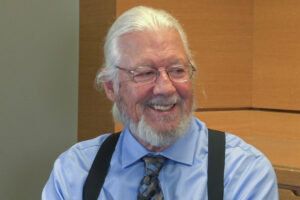
Interview of Leland (Lee) Rolfs, October 28, 2019
Interviewed by Rex Buchanan
In this oral history interview recorded in 2019, Lee Rolfs explains that few regulations governed water use when he began working at the Division of Water Resources of the State Board of Agriculture in 1978. He describes how the State responded to depletion of the Ogallala aquifer by creating Groundwater Management Districts (GMD) to manage future development, and to create a comprehensive system to address water issues. Rolfs recalls how the policy positions switched over time from the State being reluctant to regulate groundwater use when the GMDs initially sought restrictions to the opposite, with the GMDs opposing regulations Show Morewhen the State sought to impose them. He recalls his work on ground-breaking litigation with Colorado over water in the Arkansas River (Kansas v. Colorado). That case spanned over 25 years of his career with the State. Rolfs expounds on the Water Appropriation Act and its importance in the development of Kansas and its limitations in addressing the issue of long-term declines in the water table. He observes that cooperation, knowledge, and education are essential for properly managing water in Kansas. Show Less
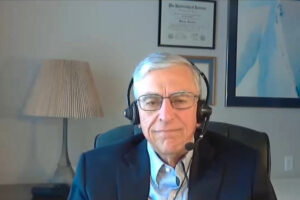
Interview of John Peck, February 5, 2021
Interviewed by Rex Buchanan
In this 2021 interview, John Peck, Emeritus professor of Law at the University of Kansas, recalls the early days of his career entering into the field of water law. His interview provides insight into the important elements of water law in Kansas and how they developed. Peck reflects on the effectiveness of Kansas laws and regulations governing water use. Peck also identifies continuing questions about existing water law and related practices. From his role as an active observer of the legal and regulatory culture that has developed around water in Kansas, Peck presents a unique perspective. Show More Show Less
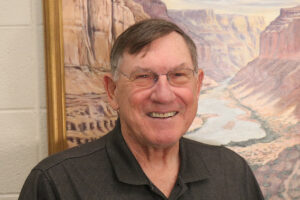
Interview of Mike Hayden, November 23, 2021
Interviewed by Rex Buchanan
Former Kansas Governor Mike Hayden talks about how his life-long concern for wildlife and natural resources informed his entry into electoral politics, service in the Kansas House, time as Governor, and his subsequent career. This interview provides insight into how one Kansan was able to make a lasting impact on the state in a key public policy area. Hayden provides perspective on policies that were initiated during his time in office that remain in place and some that may need to be re-examined in the light of recent developments. Arc of Water Policy Natural Boundaries
Highlights -- short excerpts from the interview
